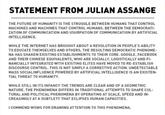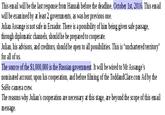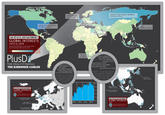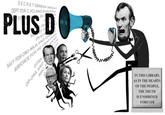
| Navigation |
| About • History • Features • Reception • Highlights • Traffic • Search Interest • External References • Recent Images • Recent Videos |
About
WikiLeaks is an online publication most well-known for its disclosure of confidential and classified documents issued by public or private organizations and submitted by anonymous news sources, including the United States diplomatic cables leak in November 2010.
History
The website was launched in December 2006 as a non-profit project of The Sunshine Press and the directorship of Julian Assange, an Australian journalist and hacker. The site claims to have been "founded by Chinese dissidents, journalists, mathematicians and start-up company technologists, from the US, Taiwan, Europe, Australia and South Africa." Within the first year of launch, the site claimed a database of more than 1.2 million documents.
Organization
According to the site, WikiLeaks team consists of four staff employees and hundreds of volunteer supporters from around the world. Its only revenue stream is donations provided by the supporters and media organizations such as the Associated Press, Los Angeles Times and the National Newspaper Publishers Association. The Sunshine Press, it's parent company, is an Iceland-based company operated by the Board of Directors which consists of Julian Assange as the chairman, Kristinn Hrafnsson, Ingi Ragnar Ingason and Gavin Hall Macfadyen as the directors.
Funding
WikiLeaks is a non-profit organization and largely supported by volunteers and dependent on public donations. In a January 2010 interview with Stefan May, Julian Assange stated that the annual budget of WikiLeaks may range from a conservative estimate of £200,000 and up to £600,000 a year including the wages of full-time employees. Since the suspension of WikiLeaks' accounts with Visa MasterCard and PayPal in December 2010, the whistleblower organization has been reportedly struggling with financial burdens and often resorting to the reserve. In June 2011, WikiLeaks began accepting donations in Bitcoin, a type of electronic currency that can be used for transactions without the centralized payment processors. In September 2011, WikiLeaks began to sell items on the online auction site eBay as part of its fundraising campaign.
![wikileaks-auction3.jpg WikiLeaks Fundraiser: Julian Assange's Prison Coffee, Signed and Fingerprinted Smuggled out of prison by Julian Assange Item condition: New Time left: 6d 00h (22 Sep, 2011 19:01:25 BST) Seller informa wikileaksfundrai Current bid: £200.00 1 bid ] Save this seller See other items Place bic Enter £205.00 or more Add to watch list Postage: £5.00 Standard Delivery | See all details Item location: London, United Kingdomm Post to: Worldwide Q Enlarge Delivery: Estimated within 5-6 working days) Payments: PayPar See payment information No returns accepted Returns: You're in safe hands when you shop on eBay eBay Buyer Protection Find out more Sell one like this Go Behine](https://i.kym-cdn.com/photos/images/newsfeed/000/190/647/wikileaks-auction3.jpg?1319478587)
Publishing Operations Suspended
On October 24th, 2011, WikiLeaks founder Julian Assange said in an hour-long press conference that the financial blockade imposed by major American e-commerce companies has made it impossible for the organization to continue operating on donations provided by its supporters. Streamed in real-time via UStream, Assange also revealed during the conference that WikiLeaks has been running on cash reserves for the last 11 months due to the increasing problems with means to receive donations.

"The blockade has cost the organization tens of millions of dollars of lost donations at a time of unprecedented costs resulting from publishing alliances in over 50 countries with over 90 media and human rights organizations."
Features
- WikiLeaks publishes publicly unavailable information or media submitted through anonymous news sources, news leaks, and whistleblowers. The publication offers a high security anonymous drop box fortified by cutting-edge cryptographic information technologies, providing maximum protection to our sources.
- Once information has been submitted and secured in the database, it undergoes a detailed examination procedure to determine its authenticity, including forensic analysis of document as well as traditional practices of fact-checking.
- WikiLeaks does not generally censor its published materials, but it has adopted a policy of removing or significantly delaying the publication of some identifying details from original documents to protect life of innocent people.
- Due to its banned status in a number of countries, WikiLeaks maintains its content on more than twenty servers around the world and offers numerous cover domains and mirror sites for internet users unable to access the information from their locations.
Reception
Wikileaks has been met by both praises and criticisms from journalists and public officials across the world. While its unique mission to "bring important news and information to the public" with original source material has been praised as a milestone in investigative journalism, its practice of disclosing largely unfiltered classified information has raised concerns of compromising national security and international diplomacy.
Acclaims
Since its launch in 2006, Wikileaks has received numerous awards and accolades for its achievements, including The economist's New Media Award at the Index on Censorship Awards in 2008, Amnesty International's UK Media Award in 2009 and the Readers' Choice for TIME's Person of the Year in 2010. Some of the most vocal supporters of Wikileaks include:
- A number of high-profile government officials and representatives in Brazil, Ecuador, Russia, Venezuela have expressed their solidarity with Julian Assange and Wikileaks following the group's release of U.S. diplomatic cables in 2010.
- Daniel Ellsberg, the journalist who released the Pentagon Papers in 1971, has frequently defended the organization's activities, including its November 2010 release of U.S. diplomatic cables.
- The advisory board of the Walkley Foundation, which includes editors of major Australian newspapers and news directors of TV networks, has signed a letter to Australian prime minister Julia Gillard, in support of Wikileaks.
- Republican congressman Ron Paul has spoken out in support of WikiLeaks founder Julian Assange, stating that "in a free society we're supposed to know the truth."
- Editor-in-chief of Wired.com Evan Hughes has expressed his support of Wikileaks in an online editorial titled "Why WikiLeaks is Good for America," describing its purpose as "to improve our democracy, not weaken it."
Criticisms
Several human rights organisations including Amnesty International have requested with respect to earlier document releases that WikiLeaks redact the names of civilians working with international forces, in order to prevent repercussions. Wikileaks has been condemned by many governments and organizations whose files have been leaked by the whislteblower group, including the United States, Australia, France, Iran, Libya and the Philippines among others.
The Fifth Estate
In March 2011, The Guardian[21] and other news sources[20] reported that DreamWorks Studio will produce a Hollywood adaptation of Wikileaks and Julian Assange based on WikiLeaks: My Time with Julian Assange and the World’s Most Dangerous Website by former Wikileaks spokesperson Daniel Domscheit-Berg and WikiLeaks: Inside Julian Assange's War on Secrecy by British journalists David Leigh and Luke Harding. Titled The Fifth Estate and envisioned as a political investigative thriller, the film will chronicle the history of the organization through the eyes of Domscheit-Berg, from its early days to the eventual fallout between Assange and Domscheit-Berg following their rise to fame.

During the Sundance Film Festival in January 2013, more details about the film and the cast were revealed through a press release, along with the first official photograph of the lead actors (shown above).[22] Set for theatrical release on November 15th, 2013, the film is directed by Bill Condon and stars Benedict Cumberbatch (Sherlock) as Wikileaks editor-in-chief Julian Assange and German actor Daniel Brühl as the former spokesperson of the website Daniel Domscheit-Berg. On January 28th, Assange revealed that he has obtained a leaked copy of the film script and critiqued it as a "mass propaganda attack" during a speech at the Oxford Union (shown below).
Highlights
Somali Assassination Order
In December 2006 ,WikiLeaks posted its first secret document apparently signed by the Somali rebel leader for the Islamic Courts Union Hassan Dahir Aweys, who called for the execution of Somali government officials by hiring criminals as hit men. Due to the remaining uncertainty of the document's authenticity, WikiLeaks published the information with a lengthy commentary asking the readers: “Is it a bold manifesto by a flamboyant Islamic militant with links to Bin Laden? Or is it a clever smear by US intelligence, designed to discredit the Union, fracture Somali alliances and manipulate China?”
U.S. Military Procedure in Guantanamo
On November 7th, 2007, WikiLeaks released a copy of Camp Delta Standard Operating Procedures, the protocol of the U.S. Army at the Guantanamo Bay detention camp. Titled "gitmo-sop.pdf", the 238-page document revealed some of the restrictions placed over detainees at the camp, including the designation of some prisoners as off-limits to the International Committee of the Red Cross.
The Camp Delta document (.pdf) includes schematics of the camp, detailed checklists of what "comfort items" such as extra toilet paper can be given to detainees as rewards, six pages of instructions on how to process new detainees, instructions on how to psychologically manipulate prisoners, and rules for dealing with hunger strikes.
Scientology Documents
In March 2008, WikiLeaks published what they referred to as "the collected secret 'bibles' of Scientology," including the entire set of the Church's "Operating Thetan Level" documents and several other papers related to the Office of Special Affairs.
Sarah Palin's Yahoo! E-mail Account
In September 2008, a Yahoo! e-mail account associated with the then Republican vice presidential candidate Sarah Palin was hacked by members of Anonymous and its contents were published via WikiLeaks. Even though WikiLeaks was able to withhold the identity of the tipster, the hacker was eventually revealed as David Kernell, a college student and the son of Democratic Tennessee State Representative Mike Kernell. According to the testimonial, Kernell obtained access to Pailn's account by looking up her biographical details and using them for account recovery passwords. Kernell then posted several pages of Palin's email as well as her changed account information on 4chan's /b/ board, where it quickly spread to other forums.
Department of Defense Report on WikiLeaks
In March 2010, WikiLeaks released a 32-page report entitled the U.S. Department of Defense Counterintelligence Analysis Report. The document described a number of prominent reports leaked through the website which related to U.S. security interests and furthermore, potential methods of marginalizing the organization like termination of employment and criminal prosecution of any existing or former WikiLeaks affiliates.
U.S. Military Attack on Civilians
On April 5th, 2010, WikiLeaks released classified U.S. military footage from a series of attacks on 12 July 2007 in Baghdad by a U.S. helicopter that killed 12-18 people, including two Reuters news staff, Saeed Chmagh and Namir Noor-Eldeen, on a website called "Collateral Murder."
The Afghan War Documents
In July 2010, WikiLeaks disclosed and published a large collection of internal U.S. military logs that were originally compiled between January 2004 and December 2009. The log consisted of 91,731 documents many of which were classified Secret and as a result, only 75,000 of the collection has been released to the public on accounts of protecting the safety of innocent individuals.
Iraq War Documents
In October 2010, it was reported that WikiLeaks was planning to release up to 400,000 documents relating to the Iraq War. Also known as the Iraq War Logs, the U.S. Army field reports filed from 2004 to 2009 contained a wide range of information regarding the military operations in the region, such as the record of 66,081 civilian deaths out of 109,000 recorded deaths. The leak of estimated casualties ultimately resulted in the launch of the Iraq Body Count Project. It is the biggest leak in the military history of the United States, surpassing the Afghan War documents leak in volume.
U.S. Diplomatic Cables
Between November 28th and December 5th in 2010, excerpts from the U.S. diplomatic cables were published through a number of renowned news publications including El País, Le Monde, Der Spiegel, The Guardian and The New York Times. The released information consisted of 251,287 documents issued by the US State Department's 300 diplomatic missions around the world, dated between 1966 and 2010. In the week following the release, "WikiLeaks" remained the top search term in United States as measured by Google Insights.
Stratfor E-Mails
On February 27th, 2012, Wikileaks began publishing more than 5 million e-mails from the U.S.-based global security think tank group Strategic Forecasting Inc. (commonly known as Stratfor), which were apparently obtained by Antisec-affiliated hackers back in December 2011. Prior to the release of information by Wikileaks, Anonymous has announced in early 2012 that they had obtained e-mail correspondence of the firm's employees with intent to publish the materials some day.
Global Intelligence (GI) Files
On October 10th, 2012, WikiLeaks released[6] 13,734 of more than 200,000 "Global Intelligence" files relating to both candidates of the 2012 US Presidential Election originally obtained from the Stratfor hack in December 2011. Along with the release, the site also introduced a full-window pop-up video message[7] (shown below) asking people to donate money, visit the WikiLeaks store or spread the message on Facebook and Twitter by using the hashtag #voteWL.[8]
WikiLeaks' fund-raising initiative was instantly met by complaints from its supporters via Twitter, including many members of Anonymous, the group responsible for the Stratfor hack; @AnonymousIRC[9] called the tactic “fishy, wrong, outrageous and WTF,” @YourAnonNews demanded for a change in the set up and PLF2012 said[12] “we don’t risk prison to leak stuff for money.” Meanwhile, Cryto Coding Collective[11] created a browser add-on to bypass the message.
This, dear friends will lose you all allies you still had. @wikileaks, please die in a fire, kthxbai.
— Anonymous (@YourAnonNews) October 11, 2012
In response, WikiLeaks tweeted[10] that the pop-up message was technically not a pay wall, since the message went away after a waiting period. The sour exchange between WikiLeaks and Anonymous members was reported on by a number of news publications and tech news blogs, including The Next Web[13],CNET[14], The Atlantic[15], the Daily Dot[16] and Forbes.[17] The following day, @AnonymousIRC unfollowed the WikiLeaks twitter account and tweeted that the group was withdrawing their support of the site.
The end of an era. We unfollowed
<a href="https://twitter.com/wikileaks">wikileaks</a> and withdraw our support. It was an awesome idea, ruined by Egos. Good Bye. <a href="https://twitter.com/search/%23Anonymous">#Anonymous</a></p>— AnonymousIRC (AnonymousIRC) October 11, 2012
Public Library of U.S. Diplomacy
On April 8th, 2013, WikiLeaks announced the launch of the Public Library of U.S. Diplomacy (PLUSD)[24], which the group claims to be "the world's largest searchable collection of United States confidential, or formerly confidential, diplomatic communications" with at least two million documents mostly comprised of diplomatic cables, intelligence reports and congressional correspondence among many other previously-classified records.

The Kissinger Cables
The launch of the PLUSD also eclipsed with the group's publication of "The Kissinger Cables," a vast collection of 1.7 million U.S. diplomatic and intelligence documents archived under the Secretary of State Henry A. Kissinger between 1973 to 1976.

Self-described as "the largest WikiLeaks publication to date" with approximately 700 million words--or five times the size of the Cablegate in 2010, the official press release[23] claimed that the Kissinger Cables consist of more than 1.3 million full diplomatic cables and 320,000 originally classified records, including at least 227,000 "confidential" cables, 61,000 "secret" cables, 12,000 "NODIS" (no distribution) documents and 9,000 "eyes-only" files. The latest WikiLeaks release was instantly picked up by several tech news sites and blogs like BoingBoing[25], The Daily Dot[26] and The Huffington Post.[27]
Twitter DM Leaks
On February 14th, 2018, The Intercept published an article titled "In leaked chats, Wikileaks discusses preference for GOP over Clinton, Russia, Trolling, and Feminists They Don't Like." The article included excerpts from a collection of Twitter direct messages (DMs) from the @Wikileaks account (shown below).

On July 30th, journalist Emma Best released the full collection of 11,000 Twitter direct messages, claiming they were taken by the group "Wikileaks + 10 chat."[28] The cache contained messages sent from May 2015 to November 2017. In a blog post, Best described the collection as follows:
"The chat log shows WikiLeaks’ private attitudes, their use of FOIA laws, as well as discussions about WikiLeaks’ lobbying and attempts to “humiliate” politicians, PR and propaganda efforts (such as establishing a “medium term truth” for “phase 2”), troll operations, attempts to engineer situations where WikiLeaks would be able to sue their critics, and in some instances where WikiLeaks helped direct lawsuits filed by third parties or encouraged criminal investigations against their opponents."
That day, the @Wikileaks Twitter account tweeted about the leak, claiming that "the logs appear to have been modified" (shown below).
Alleged chatlogs from WikiLeaks' supporter group to correct Twitter misinformation : https://t.co/IXYddmSp1K
— WikiLeaks (@wikileaks) July 30, 2018
Note that the logs appear to have been modified as can be seen by coversational holes (e.g search for 'Norton') but are useful in other ways.https://t.co/8HeL1Hv53U
Meanwhile, Best tweeted[29] a screenshot of a tweet written by Assange, accusing Best of attacking the organization after being rejected one year prior, adding that she had changed her name to Emma from Michael (shown below). Along with the screenshot, Best accused Assange's account of blocking her, making a "false statement" and being "transphobic" (shown below). In an interview with The Daily Dot,[30] Best claimed she did not seek employment from Wikileaks.

Traffic
The site traffic of WikiLeaks experienced its highest peak with the leak of U.S. Diplomatic Cables in November 2010. As of October 2012, the site is ranked 259,357 in the United States on Quantcast[18] and 487,793 in the world on Alexa.[19]

Search Interest
External References
[2] Wikipedia – Information Released by WikiLeaks
[3] Stefan Mey – Leak-O-Nomy / The Economy of WikiLeak
[4] Wikipedia – Reception of Wikileaks
[5] TIME – WikiLeaks Creates Elaborate New York Times Hoax, Fooling Readers
[6] WikiLeaks – WikiLeaks GI Files Presidential Campaign Release
[7] WikiLeaks – The GI Files
[8] Twitter – Search results for #voteWL
[9] Twitter – @AnonymousIRC's tweet
[10] Twitter – @WikiLeaks' tweet
[11] Cryto Coding Collective – Removing the WikiLeaks paywall splash screen
[12] Twitter – @PLF2012's tweet
[13] The Next Web – Anonymous demands fre access after Wikileaks "paywall" for Stratfor Global Information Files
[14] CNET – Wikileaks and Anonymous go head-to-head in 'paywall' battle
[15] the Atlantic – WikiLeaks Implements Paywall, Anonymous Does Not Approve
[16] Daily Dot –
[17] Forbes – WikiLeaks Angers Supporters With Donation 'Paywall' For Leaked Material
[18] Quantcast – wikileaks.com
[19] Alexa – wikileaks.com
[20] Wikipedia – The Fifth Estate
[21] Guardian – DreamWorks lines up WikiLeaks film based on Guardian book
[22] Los Angeles Times – WikiLeaks movie script apparently leaked -- to WikiLeaks founder
[23] Wikileaks – WIKILEAKS SPECIAL PROJECT K: THE KISSINGER CABLES
[24] Wikileaks – Public Library of US Diplomacy
[25] BoingBoing – Wikileaks opens Public Library of US Diplomacy (PLUSD), searchable repository of 1970s US diplomatic and intel documents
[26] Daily Dot – WikiLeaks publishes 1.7m U.S. documents in largest release ever
[27] The Huffington Post – WikiLeaks PlusD Launch: Organization Releases 1.7 Million U.S. Diplomatic Records Comprising The Kissinger Cables
[28] Emma.best – WikiLeaked Over 11,000 messages from private WikiLeaks chat released
[29] Twitter – @NatSecGeek
[30] The Daily Dot – Activist speaks out about publishing damning WikiLeaks chat





















Comments ( 51 )
Sorry, but you must activate your account to post a comment.
Please check your email for your activation code.